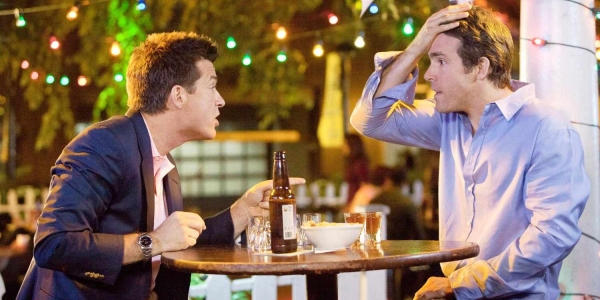The Change-Up is the latest entry into this genre, and while it adds healthy doses of raunchy Judd Apatow-like humour into the mix it hardly adds anything new or fresh to the formula. Here it is uptight lawyer Dave Lockwood (Jason Bateman) and slacker wannabe actor Mitch Planko (Ryan Reynolds) who swap roles. The pair have been best friends since school, but personality wise they are polar opposites. Dave is a workaholic lawyer who is in the running for a coveted partnership at his law firm. His success depends on his negotiations with a Japanese company in a multi-billion dollar deal. He is happily married to Jamie (Leslie Mann) and has three young children, including twin babies. Mitch on the other hand is the consummate single playboy slacker with little ambition. He spends his time sleeping late, smoking weed, and having sex with different exotic women.
But after a night out on the town, both admit that they are a little disenchanted at how their lives have turned out and grudgingly envy the other’s life. While urinating in a fountain, they both utter the fateful words: ”I wish I had your life!” Something mystical happens. Lightning crackles, a blackout follows. And hey, presto! The next morning they wake up in each other’s bodies, and over the course of the next few days they learn some important life lessons. Their egos are bruised and the failings are exposed. Mitch struggles to deal with Dave’s high-powered work place, while Dave comes to enjoy Mitch’s lazy, easy-going life style.
Director David Dobkin has worked on a lot of comedy films, like Wedding Crashers, Shanghai Knights, etc, but his handling of the material lacks subtlety. The level of raunchy humour is not surprising, since the writers Jon Lucas and Scott Moore have been responsible for films like The Hangover and its sequel. Ever since the success of Knocked Up and The Hangover it has become the norm for mainstream comedies from Hollywood to inject puerile, crass, scatological humour into their films. We only have to wait a couple of minutes for the first pooh joke, and there does seem to be a preoccupation with bodily functions throughout the film. And the film revisits those male anxieties of the Hangover films, without adding anything particularly new.
The humour here is more hit and miss than with the pair’s Hangover films, and while some moments work a treat, a lot of it falls a little flat. And by the end, the filmmakers have obviously played it safe, opting for more conservative values rather than taking risks with the material.
Bateman, who can also be seen in Horrible Bosses, moves effortless from roles in edgy, subversive independent black comedies like the little seen Extract, to more mainstream comedies with a raunchy edge like The Switch, etc. Here he brings his usual intensity to his role, but he also manages to shed his usual personality to play against type when trapped in Mitch’s body. Reynolds’ usually glib, superficial screen persona is perfectly suited to his role here as the irresponsible Mitch, and this is a better fit for him than the recent misfire of superhero adaptation Green Lantern. But the chemistry between the two works and adds to the film enormously.
Mann makes the most of her role as Bateman’s harried, frustrated wife, while Alan Arkin is wasted in a thankless role as Reynolds’ estranged father. Olivia Wilde is also good in a small role as Sabrina, Dave’s sexy legal associate.







